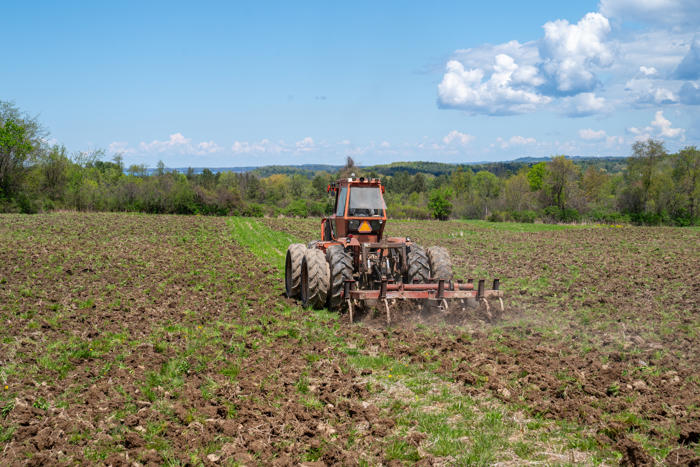American Agriculture Can't Afford Another Trade War with China | Opinion

CHARLOTTE, VERMONT - MAY 11: Farmer Aime LaBerge steers a 1981 Allis Chalmers tractor as he plows one of his soybean growing fields on May 11, 2024 in Charlotte, Vermont.
American agriculture stands at a crossroads. With our farmers still reeling from the financial turmoil of the past few years, the prospect of another economic conflict with China is untenable. From 2018 to 2020, American farmers faced devastating losses due to the trade conflict with China. During this period, U.S. agricultural exports to China plummeted, with losses exceeding $25 billion. Soybean farmers felt the brunt of this impact. Their exports to China dropped sharply from $12.2 billion in 2017 to just $3.1 billion in 2018. This downturn prompted a 15 percent reduction in the soybean planted area by 2019, as farmers adjusted to a new economic landscape.
China is not just a trade partner; it is a lifeline for American agriculture. In 2023, the country emerged as the largest market for U.S. agricultural exports, with a total value of more than $28 billion. Key commodities like soybeans, corn, beef, cotton, pork, poultry, and dairy products form the backbone of this trade relationship. These exports are more than numbers on a balance sheet; they represent the livelihood of thousands of American farmers.
The previous trade conflict led China to seek alternative sources for its agricultural needs—a shift that had lasting consequences for U.S. exporters. The Phase One Agreement, intended to increase China's agricultural purchases from the U.S., fell short of expectations. China's commitments were only partially fulfilled by the end of 2021. The U.S. government responded with the Market Facilitation Program, which provided $23 billion in federal subsidies to affected farmers, a cost that taxpayers had to bear.
In light of these challenges, the notion of imposing new tariffs on Chinese goods is perilously misguided. While on the campaign trail, former president Donald Trump proposed tariffs as steep as 60 percent on Chinese imports. Ahead of this year's election, President Joe Biden announced a significant hike in tariffs on various Chinese goods and the continuation of tariffs on over $300 billion of Chinese products implemented by his predecessor. Such measures are likely to provoke retaliatory actions. American farmers, who are still recovering from the last trade conflict and pandemic-era disruptions, cannot afford another round of economic turmoil.
The impact of heightened trade tensions would not be confined to the agricultural sector. The ripple effects would resonate throughout the U.S. economy, worsening inflation. Higher tariffs would result in increased prices for goods and services, putting more pressure on household budgets at a time when many Americans are already facing heightened costs.
In the aftermath of the last trade conflict, agricultural leaders in the United States have expressed deep concerns over the deterioration of trust and stability in America's relationship with China. Many are understandably wary of China's state-controlled trade practices and the unpredictable nature of its purchasing patterns. Issues related to intellectual property theft and overblown concerns over Chinese ownership of U.S. agricultural land add to the complexity of this relationship. However, escalation of tariffs is not the answer. It is imperative to pursue diplomatic solutions to these issues without resorting to measures that would harm the agricultural economy.
Reestablishing productive trade relations with China is crucial for the future of U.S. agriculture. The Chinese market was an emerging destination for American agricultural products before the 2018 trade conflict. Diplomatic negotiations with China aimed at creating fair and enforceable trade agreements can provide more stability for American farmers. Investing in the diversification of export markets is also essential. Strengthening trade relationships with other nations can help reduce trade dependence on a single country and allow the agricultural sector to better withstand future global market disruptions.
The future of American agriculture is at a pivotal juncture. The path forward should focus on providing stability and growth for American farmers, rather than exposing them to the uncertainties of another trade war. Our farmers deserve policies that support their livelihoods and ensure the prosperity of our agricultural sector.
David L. Ortega is Faculty Laureate and Associate Professor in the Department of Agricultural, Food and Resource Economics at Michigan State University.
The views expressed in this article are the writer's own.
Related Articles
Start your unlimited Newsweek trial
